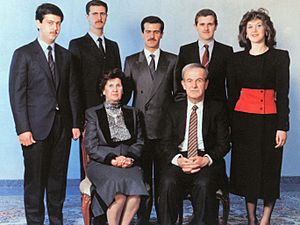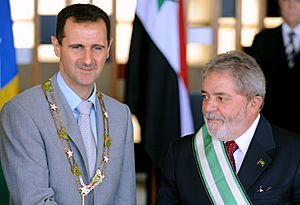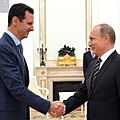Bashar al-Assad facts for kids
Quick facts for kids
Bashar al-Assad
|
|
|---|---|
|
بشار الأسد
|
|
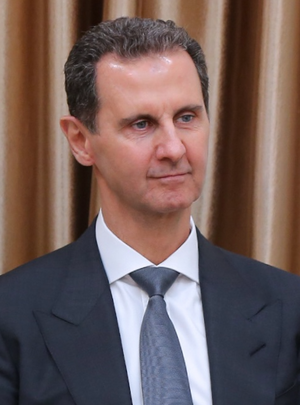
Assad in 2024
|
|
| 19th President of Syria | |
| In office 17 July 2000 – 8 December 2024 |
|
| Prime Minister |
See list
Muhammad Mustafa Mero
Muhammad Naji al-Otari Adel Safar Riyad Farid Hijab Omar Ibrahim Ghalawanji Wael Nader al-Halqi Imad Khamis Hussein Arnous Mohammad Ghazi al-Jalali |
| Vice President |
See list
Abdul Halim Khaddam
(2000–2005) Zuhair Masharqa (2000–2006) Farouk al-Sharaa (2006–2014) Najah al-Attar (2006–2024) Faisal Mekdad (Sep–Dec 2024) |
| Preceded by |
|
| Succeeded by | Ahmed al-Sharaa |
| General Secretary of the Central Command of the Arab Socialist Ba'ath Party | |
| In office 24 June 2000 – 8 December 2024 |
|
| Deputy |
|
| Preceded by | Hafez al-Assad |
| Succeeded by | Ibrahim al-Hadid (acting) |
| Personal details | |
| Born | 11 September 1965 Damascus, Syrian Arab Republic |
| Political party | Arab Socialist Ba'ath Party (until 2024) |
| Other political affiliations |
National Progressive Front |
| Spouse | |
| Children | 3, including Hafez |
| Parents |
|
| Relatives | Assad family |
| Residences |
|
| Education | Damascus University (MD) |
| Signature |  |
| Military service | |
| Allegiance | |
| Branch/service | Syrian Arab Armed Forces |
| Years of service | 1988–2024 |
| Rank | Field marshal |
| Unit | Republican Guard (until 2000) |
| Commands | Syrian Arab Armed Forces |
| Battles/wars | Syrian civil war |
Bashar al-Assad (born 11 September 1965) is a former Syrian politician and military officer. He was the 19th president of Syria from July 2000 until December 2024. His father, Hafez al-Assad, was president before him from 1971 to 2000. During his father's time, Syria changed from a republic to a country with a strong family rule.
Contents
Early Life and Family
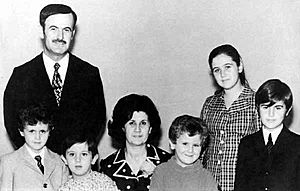
Bashar Hafez al-Assad was born in Damascus on 11 September 1965. He was the second son of Anisa Makhlouf and Hafez al-Assad. The name Al-Assad means "the Lion" in Arabic. His grandfather changed the family name to Al-Assad in 1927.
Bashar's father, Hafez, came from a humble family. He rose through the ranks of the Ba'ath Party. He became president of Syria in 1970. Hafez promoted people loyal to him within the party and the military.
Bashar had five siblings. A sister named Bushra died when she was a baby. His youngest brother, Majd, died in 2009 after a long illness.
Unlike his brothers Bassel and Maher, Bashar was quiet. He was not very interested in politics or the military. He was described as "soft-spoken" and a bit shy. Bashar said he only went into his father's office once when his father was president.
Education
Bashar went to the Arab-French al-Hurriya School in Damascus. After high school, he studied medicine at Damascus University.
Becoming a Leader
Medical Career
In 1988, Bashar finished medical school. He started working as an army doctor. Four years later, he moved to London. There, he trained to become an eye doctor (ophthalmologist). People who knew him in London said he was a "geeky I.T. guy."
Bashar's older brother, Bassel, was expected to become president. But Bassel died in a car accident in 1994. After this, Bashar was called back to Syria. The government then started to present Bashar as the next leader. They wanted to prepare him to continue the Assad family's rule.
Preparing for Power
After Bassel's death, Hafez al-Assad decided Bashar would be his successor. For the next six years, Hafez prepared Bashar to take over. This involved three main steps:
- Building support for Bashar in the military.
- Making Bashar's image well-known to the public.
- Teaching Bashar how to run the country.
To gain military experience, Bashar joined the Homs Military Academy in 1994. He quickly rose through the ranks. By 1999, he was a colonel in the elite Syrian Republican Guard. Many older military leaders retired, and younger officers loyal to Bashar took their places.
In 1998, Bashar also took charge of Syria's relationship with Lebanon. This role had been handled by Vice President Abdul Halim Khaddam. By taking over, Bashar gained more power. He also helped install Émile Lahoud as the President of Lebanon, who was a strong ally.
At the same time, Bashar became involved in public affairs. He led a campaign against corruption. This helped his image as a modern leader. He also became the head of the Syrian Computer Society. He helped bring the internet to Syria, which made him seem like a reformer.
His Time as President
On 17 July 2000, Bashar al-Assad became president of Syria. He took over after his father died. He was re-elected in 2000, 2007, 2014, and 2021. The elections in 2014 and 2021 happened during a time of conflict in Syria. They were held only in areas controlled by the Syrian government.
When he first became president, some people in Western countries hoped he would bring reforms. However, his economic changes led to more inequality. This made many people in Syria unhappy.
In 2011, protests began in Syria. These protests were part of a larger movement called the Arab Spring. The government responded with force. This led to a long and difficult period of conflict known as the Syrian civil war. Many countries, including the United States, the European Union, and most of the Arab League, asked Assad to step down. The civil war caused a lot of suffering and led to many deaths.
End of His Leadership
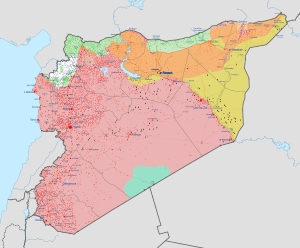
Territories held by the SDF (yellow), IS (grey), the Syrian Army (red), the SNA and Turkey (light green), Tahrir al-Sham (white), the SFA and the United States (teal).
In November 2024, groups of Syrian rebels launched new attacks. Their goal was to remove Assad from power. On 7 December 2024, rebel forces were close to taking Damascus. Bashar al-Assad left Syria by plane and went to Moscow. The Assad family's rule in Syria came to an end. Russian state media reported that he arrived in Moscow on 8 December 2024 and was granted a safe place to stay.
Personal Life
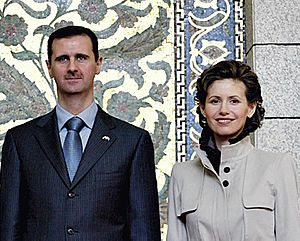
Bashar al-Assad speaks English very well and some French. He learned these languages at school in Damascus.
In December 2000, he married Asma Akhras. She is a British citizen of Syrian background. They have three children: a son named Hafez (born 2001), a daughter named Zein (born 2003), and another son named Karim (born 2004).
Bashar al-Assad is an Alawite Muslim. His sister, Bushra al-Assad, and mother, Anisa Makhlouf, moved to the United Arab Emirates in 2012 and 2013. His mother died in Damascus in 2016.
Images for kids
-
Bassel al-Assad, Bashar's older brother, died in 1994, paving the way for Bashar's future presidency.
-
The crime-scene in Beirut where Hariri and 21 others were killed in a terrorist attack in February 2005. The area was cordoned off to conduct an international investigation.
-
Protesters take to the streets during Lebanon's "Independence Intifada", also known as the Cedar Revolution
-
Destroyed vehicle on a devastated Aleppo street, 6 October 2012
-
Assad greeting Russian President Vladimir Putin, 21 October 2015
-
Assad with Russian defense minister Sergei Shoigu, 9 September 2017
-
Bashar al-Assad meets with Iran's representative on Syrian affairs, Ali Akbar Velayati, 6 May 2016
-
Assad with Iranian President Ebrahim Raisi in Damascus, 3 May 2023
-
Syrian opposition at its greatest extent, March 2013
-
Military-Ba'ath party nexus constructed by Hafiz al-Assad during the 1970s constitute the backbone of Bashar al-Assad's (centre) dictatorship
-
Anti-Assad demonstrations in Berlin, 18 March 2023
-
Anti-Assad demonstrations held in Paris, 14 December 2016
-
Bashar al-Assad with his wife Asma in Moscow, 27 January 2005
See also
 In Spanish: Bashar al-Ásad para niños
In Spanish: Bashar al-Ásad para niños
- List of international presidential trips made by Bashar al-Assad
- Presidency of Hafez al-Assad
 | Georgia Louise Harris Brown |
 | Julian Abele |
 | Norma Merrick Sklarek |
 | William Sidney Pittman |


